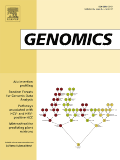
GENOMICS PROTEOMICS & BIOINFORMATICS
Scope & Guideline
Pioneering innovations in genomics and proteomics since 2003.
Introduction
Aims and Scopes
- Genomic Characterization and Analysis:
The journal emphasizes genomic studies that include genome sequencing, assembly, and annotation, as well as the exploration of genomic variations and their implications in various biological contexts. - Proteomics and Protein Analysis:
Research related to proteomics is a core area, focusing on protein identification, quantification, and functional characterization, as well as the study of post-translational modifications and protein interactions. - Bioinformatics Tools and Methodologies:
A significant portion of the publications discusses the development and application of computational tools for data analysis, including algorithms for sequence alignment, variant calling, and integrative multi-omics approaches. - Single-cell and Spatial Omics:
The journal highlights cutting-edge research in single-cell genomics and spatial transcriptomics, which aim to unravel cellular heterogeneity and the spatial organization of gene expression within tissues. - Applications in Health and Disease:
Many articles focus on the implications of genomic and proteomic research in understanding diseases, including cancer genomics, microbiome studies, and pharmacogenomics.
Trending and Emerging
- Integration of Multi-Omics Data:
There is a growing trend towards studies that integrate various omics data types (genomics, transcriptomics, proteomics, and metabolomics) to provide a holistic view of biological systems and disease mechanisms. - Artificial Intelligence and Machine Learning Applications:
The use of AI and machine learning techniques for data analysis, particularly in predicting protein interactions, genomic variations, and disease outcomes, is increasingly prevalent in recent publications. - Single-Cell and Spatial Transcriptomics:
Research focusing on single-cell technologies and spatial transcriptomics is on the rise, as these approaches allow for a more detailed understanding of cellular diversity and tissue architecture. - RNA Modifications and Epitranscriptomics:
The exploration of RNA modifications, particularly m6A methylation and its implications in cellular regulation and disease, is emerging as a significant area of interest. - Microbiome Research in Health and Disease:
Studies investigating the role of the microbiome in human health, disease, and their complex interactions with host genomics are increasingly featured, highlighting their importance in precision medicine.
Declining or Waning
- Traditional Genomic Techniques:
There is a noticeable decrease in publications focused solely on traditional genomic methods, such as basic Sanger sequencing, as researchers increasingly adopt next-generation sequencing technologies. - Basic Bioinformatics Training:
Topics centered around fundamental bioinformatics training and introductory methodologies are becoming less frequent, likely due to the growing accessibility of online resources and courses that cover these basics comprehensively. - Standalone Proteomics Studies:
Research that focuses solely on proteomics without integration with genomics or transcriptomics is appearing less frequently, suggesting a trend towards interdisciplinary studies that combine multiple omics layers. - Static Genomic Databases:
The publication of static genomic databases is waning as the field moves towards dynamic and integrative databases that continuously update and incorporate new findings. - Limited Methodology Comparisons:
Articles that provide limited comparisons of existing methodologies or tools are becoming less common, as the community increasingly values comprehensive benchmarking and validation studies.
Similar Journals

Briefings in Functional Genomics
Illuminating the Pathways of Genomic ScienceBriefings in Functional Genomics, published by Oxford University Press, serves as a crucial academic resource in the fields of biochemistry, genetics, and molecular biology. With an ISSN of 2041-2649 and an E-ISSN of 2041-2657, this esteemed journal explores innovative research and developments in functional genomics, with a commitment to advancing our understanding of genetic processes and their implications in health and disease. Ranking in the Q2 quartile for both Biochemistry and Genetics, and occupying a prominent Q1 status in the domain of interdisciplinary Medicine, the journal is positioned as a leading platform for researchers seeking to disseminate their findings to a global audience. Although it does not currently offer open access options, its accessibility through institutional subscriptions and its esteemed impact factor underscore its importance in the research community. Covering converging topics from 2010 to 2024, Briefings in Functional Genomics not only keeps pace with the rapidly evolving landscape of genomics but also stimulates collaboration and dialogue among scientists and industry professionals alike, making it an indispensable tool for researchers, practitioners, and students eager to engage with cutting-edge genomic science.

GENOMICS
Where Cutting-Edge Genomics Meets Rigorous ScienceGENOMICS is a prestigious journal published by Academic Press Inc Elsevier Science, dedicated to advancing the field of genetic research and molecular biology. With an impressive impact factor, this journal is recognized for its rigorous peer-review process and high-quality publications that cover a wide range of topics within the genomics discipline. Operating from the United States, GENOMICS has established itself as a vital resource for researchers, professionals, and students alike, standing at Q2 in the Genetics category according to the latest rankings. With a rich history dating back to 1987 and convergence extending to 2024, the journal highlights cutting-edge discoveries and methodologies, ensuring that its readership remains at the forefront of genetic advancements. Although currently not an open-access journal, articles published within its pages are often accessible through various academic platforms, enhancing worldwide reach and dissemination. For those engaged in the fields of biochemistry, genetics, and molecular biology, GENOMICS serves as an indispensable platform for impactful research and collaborative initiatives.

GENOME BIOLOGY
Connecting scholars to the cutting-edge of genome science.GENOME BIOLOGY is a premier, peer-reviewed journal published by BMC, focusing on the rapidly evolving fields of genomics, molecular biology, and bioinformatics. Accessible as an Open Access journal since 2000, it aims to disseminate high-quality, cutting-edge research that contributes to our understanding of genome biology's intricate mechanisms. The journal boasts an impressive impact, ranking 8th in Agricultural and Biological Sciences and 9th in Biochemistry, Genetics and Molecular Biology, highlighting its significance among scholars, professionals, and students alike. With a commitment to facilitating the exchange of invaluable scientific knowledge, GENOME BIOLOGY provides an important platform for discussions on evolutionary biology, genetic systems, and cell biology, contributing to the advancement of these dynamic disciplines.

FUNCTIONAL & INTEGRATIVE GENOMICS
Innovating Insights into Genetic IntegrationFUNCTIONAL & INTEGRATIVE GENOMICS, published by Springer Heidelberg, is a leading journal in the fields of genetics and molecular biology. Established in 2000, it serves as a pivotal platform for advancing our understanding of genomic functionality and integration, making significant contributions to both basic and applied research in genetics. With a robust impact factor and a ranking in the Q3 quartile for Genetics and Q2 for Medicine (Miscellaneous), the journal aims to publish innovative research that explores the relationships between genomic data and biological functions, appealing to a diverse audience of researchers and professionals. Although it operates under a subscription model, the journal's extensive archives remain a valuable resource for academics seeking to stay abreast of the latest findings and methodologies in genomics. As the field evolves, FUNCTIONAL & INTEGRATIVE GENOMICS remains committed to fostering scholarly dialogue and the dissemination of groundbreaking studies that influence future research trajectories.

GENOME RESEARCH
Pioneering Insights in Genomic TechnologiesGenome Research, published by Cold Spring Harbor Laboratory Press, stands as a premier journal in the field of genetics, featuring rigorous peer-reviewed research that explores the complexities of genome organization and function. With an impressive Q1 ranking in both Genetics and Clinical Genetics according to the 2023 category quartiles, this journal effectively bridges the gap between fundamental genetic science and its clinical applications. Its significance is further highlighted by its Scopus rankings, where it ranks #6 out of 99 in Clinical Genetics and #27 out of 347 in Biochemistry, Genetics, and Molecular Biology, showcasing its broad influence and access to cutting-edge discoveries. Researchers and professionals can look forward to a diverse array of articles that cover genomic technologies, bioinformatics, and translational genomics. Although not currently open access, the wealth of information available in each issue makes it an invaluable resource for anyone engaged in genetic research and applications.

Current Bioinformatics
Pioneering Research in Bioinformatics and BeyondCurrent Bioinformatics, an esteemed journal published by Bentham Science Publishers Ltd, serves as a pivotal platform for the dissemination of cutting-edge research in the fields of bioinformatics, biochemistry, computational mathematics, genetics, and molecular biology. With an ISSN of 1574-8936 and an E-ISSN of 2212-392X, this journal has established itself as a vital resource for researchers, professionals, and students keen on exploring interdisciplinary approaches to biological data analysis. Its prominence is reflected in its quartile rankings for 2023, where it stands in Q3 for biochemistry and computational mathematics, alongside Q4 rankings in genetics and molecular biology. Current Bioinformatics, located in the United Arab Emirates and converging from 2007 to 2024, aims to foster innovation in the field by presenting original research articles, reviews, and case studies that drive forward our understanding of complex biological systems through computational techniques. This journal is an integral resource for those wishing to stay at the forefront of bioinformatics research and applications.

OMICS-A JOURNAL OF INTEGRATIVE BIOLOGY
Pioneering research in biotechnology and molecular biology.OMICS-A JOURNAL OF INTEGRATIVE BIOLOGY, published by Mary Ann Liebert, Inc., is a leading peer-reviewed journal dedicated to the field of integrative biology, encompassing Biochemistry, Biotechnology, Genetics, Molecular Biology, and Medicine. With an ISSN of 1536-2310 and E-ISSN of 1557-8100, this esteemed journal stands out with its commitment to advancing scientific knowledge and research within its scope, particularly effective from its inception in 2002 through to 2024. The journal holds a commendable position in various Scopus ranks, notably achieving a Q2 quartile in Biotechnology and Medicine (miscellaneous), and continues to exemplify rigorous scholarship with an impactful focus on cross-disciplinary integration. Although not an open-access publication, OMICS ensures that its readership has access to significant findings that shape contemporary biological discourse. Researchers, professionals, and students alike are encouraged to contribute to and explore this journal, as it not only advances knowledge but also fosters collaboration among diverse scientific communities.

PROTEIN JOURNAL
Connecting Researchers to Protein BreakthroughsProtein Journal, published by Springer, stands as a significant academic resource in the fields of Analytical Chemistry, Biochemistry, Bioengineering, and Organic Chemistry. Since its inception in 1996, the journal has dedicated itself to the dissemination of high-quality research focused on protein chemistry and its biomedical applications. With an impressive impact reflected in its classification as a Q2 journal in Analytical Chemistry and Q3 in both Biochemistry and Bioengineering as of 2023, it provides an essential platform for researchers and practitioners to share their findings. The journal embraces the open-access model, enhancing accessibility to cutting-edge research. The Protein Journal is crucial for academicians, industry professionals, and students, catering to their need for rigorous scientific discourse and innovative discoveries in protein studies. With an established track record of converging over two decades of knowledge and research, it continues to influence and shape the advancements in this vital area of science.

Human Genome Variation
Transforming Genetic Understanding, One Study at a TimeHuman Genome Variation, published by SpringerNature, is an esteemed open access journal dedicated to the field of genetic research and exploration. Since its inception in 2014, the journal has been at the forefront of advancing our understanding of human genome diversity and its implications in health and disease. With an E-ISSN of 2054-345X, it features a diverse array of studies that encompass biochemistry, genetics, and molecular biology, making it an invaluable resource for researchers and professionals alike. The journal holds a Q3 ranking in both biochemistry and genetics, and a Q4 ranking in molecular biology, highlighting its growing influence within these disciplines. As the landscape of genomics continues to evolve, Human Genome Variation serves as a platform for the dissemination of high-quality research, fostering collaboration and innovation within the scientific community. Researchers and academics are invited to contribute to this pivotal journal, which not only provides open access to its content since 2014 but also aims to bridge the gap between basic research and clinical applications in genetics.

BIOINFORMATICS
Transforming Biological Research Through Computational ExcellenceBIOINFORMATICS, published by Oxford University Press, is a leading journal in the realms of biochemistry, computational mathematics, and computer science, with a notable impact factor that underscores its significance in the field. Since its inception in 1985 and continuing through its expected convergence in 2024, the journal has maintained a prestigious reputation, proudly residing in the Q1 category across multiple disciplines, including molecular biology and statistics. With a Scopus ranking placing it within the top percentiles of its categories, BIOINFORMATICS serves as an essential platform for disseminating high-quality research that advances knowledge and innovation at the intersection of biology and computational sciences. This journal not only offers both subscription and open access options, ensuring wider availability of its cutting-edge research, but it has also become a crucial resource for researchers, professionals, and students aiming to stay at the forefront of bioinformatics and related fields. Explore the latest findings and trends that define the future of biological research through this esteemed publication, any inquiries regarding the journal can be directed to its offices located at Great Clarendon St, Oxford OX2 6DP, England.